Exercise Boosts IQ in Kids and Teens: A Key to Smarter, Healthier Futures

We all know that physical activity is vital for keeping kids fit, but what if it could also make them smarter? A recent study sheds light on this exciting possibility. Researchers found that structured exercise programs improve intelligence in children and teenagers, with participants gaining an average of 4 IQ points.
Why This Study Matters
Childhood and adolescence are critical times for brain development. The study's authors emphasized that these life stages offer unique opportunities to influence cognitive growth. This meta-analysis, which compiled data from 14 randomized controlled trials involving over 3,200 young participants, aimed to explore whether exercise could be a key factor in boosting intelligence.
The researchers focused on general intelligence, often measured by IQ tests, along with subdomains like fluid intelligence (problem-solving and logical reasoning) and crystallized intelligence (accumulated knowledge and skills). The results showed notable gains in overall intelligence and fluid intelligence, while evidence for improvements in crystallized intelligence was more limited.
Key Findings
- Overall IQ Boost: On average, kids and teens participating in exercise programs experienced a 4-point increase in IQ, equivalent to the cognitive benefits of an additional year of schooling.
- Benefits for All: The cognitive benefits extended across different age groups, education levels, and baseline IQs. Children with lower starting IQs also showed significant improvements.
- Fluid Intelligence Gains: Exercise had a particularly strong impact on fluid intelligence, which includes problem-solving and adaptability.
- Broad Applicability: The benefits were observed regardless of the type or duration of the physical activity program.
Why Exercise Helps the Brain?
Physical activity doesn’t just strengthen muscles—it also enhances brain function. Exercise increases blood flow to the brain, promoting the growth of new neural connections. These changes improve attention, memory, and problem-solving skills. Regular activity also reduces stress and improves mood, creating a better environment for learning and development.
Implications for Education
This research highlights the importance of incorporating structured exercise programs into school curricula. Beyond improving physical health, such programs could significantly enhance cognitive abilities, setting children up for greater academic success and better lifelong outcomes.
Challenges and Future Research
While the study demonstrates the positive effects of exercise, it also raises questions about how to optimize these benefits. The analyzed interventions varied in type, intensity, and duration, making it unclear which specific characteristics work best.
Future studies could help standardize exercise protocols and explore long-term cognitive outcomes. Researchers also hope to translate these findings into practical strategies for schools and communities, ensuring that children and teens have access to effective and enjoyable physical activity programs.
A Call to Action
This study underscores the need for parents, educators, and policymakers to prioritize physical activity for kids and teens. Exercise isn’t just about staying fit—it’s a powerful tool for boosting intelligence, emotional well-being, and future success. By encouraging active lifestyles, we can help young people reach their full potential, both physically and mentally.
Source: Exercise Interventions and Intelligence in Children and Adolescents: A Meta-Analysis
More useful resources:
» Is IQ Important?» IQ Test for Kids
» IQ Scores Experience Unprecedented Decline: An In-Depth Analysis
» What is Mensa?
» What Is the Highest IQ Ever Recorded?